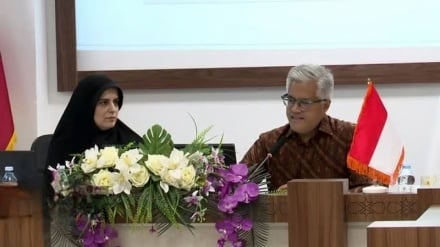Daesh terrorist outfit intent on infiltrating Southeast Asia
Daesh terrorist outfit is intent on making use of the existing capacities in Southeast Asia to further infiltrate this region; within which active terrorist outfits, Wahhabi schools, and other factors such as poverty and social networks have set the stage for acceptance of Wahhabi thoughts, and the hollow and sectarian mottos of terrorist outfits.
According to IRIB World Service, one of the most important factors behind infiltration of Daesh in Southeast Asia is poverty and existing problems in power structures, class gap, and injustice; which lay the ground for recruitment of youths in terrorist outfits. Although the predominant ethnicity in Malaysia is Malay, however, in practice, the economy and trade is under the authority of Malaysians of Chinese origin, fueling a number of domestic paradoxes in Malaysia. The local Malaysians, who constitute 60% of the population in Malaysia, are in a weaker financial position in comparison to Indian and Chinese immigrants who reside in that country. The Indian and Chinese immigrants have long controlled the pulse of trade and commerce in that country. Furthermore, the ruling Malaysian Party, United Malays National Organization (UMNO), is not interested as such in enforcing Islamic rules and regulations, while the opponents accuse the Malaysian ruling party of monopoly of the political domain of Malaysia. Therefore, extremist groups such as the so-called Islamic Jamaat, which are under the influence of Wahhabi thoughts, recruit the opponents.
Indonesia was divided in the aftermath of dictatorship of Mohammad Suharto, and upon the announcement of East Timor’s independence, some of the Indonesian provinces, under the impact of foreign interferences, demanded separation from Indonesia. Meanwhile, Jakarta administration managed to contain separatist campaigns. Nonetheless, the opponents of the government of Indonesian President, Joko Widodo, comprise of a number of opponent political, ethnical, and religious groups. Recently, upon the insulting remarks of the governor of Jakarta, who is of Chinese descent, against Holy Quran, the oppositions to Indonesian administration surfaced further; with the Indonesian government enraging the people of Indonesia more than ever, by supporting the governor of Jakarta. Meanwhile, poverty is escalating in Indonesia. Oxfam International Group has recently published a report, naming Indonesia as a country with one of the highest levels of economic inequity. Based on this report, the assets of four wealthy individuals in Indonesia total $25bn, which is nearly equivalent to the wealth of 40% of the population of Indonesia. Poverty is further spread in Philippines and Thailand in comparison to Malaysia and Indonesia, leaving a negative impact on the developments of Southeast Asia.
Moreover, the presence of a several local and international social networks in Southeast Asia, such as Facebook, Instagram, and Telegram paves the way for presence of Daesh in the region. These social networks are the most significant tools of Daesh for organization of propaganda campaigns and recruitment of operatives. The Singaporean minister of defense, who had recently attended an American think tank, announced that the operatives who were recruited by Daesh terrorist outfit in the past three years are more than the operatives, who have been recruited by Al-Qaeda terrorist group in the past ten years.
Meanwhile, the Malaysian counterterrorism expert, Ahmad Al-Mahmoudi, in an assessment of the root causes of dispatch of Daesh forces to Southeast Asia, announced this terrorist group intends to compensate its failures in Iraq and Syria by dispatching its operatives to Southeast Asia. The regions under the authority of Daesh terrorist outfit are shrinking, which leaves a negative psychological impact on this terrorist group.
The Malaysian paper, New Street Times, has stated that Malaysia has turned into one of the destinations of Daesh terrorist outfit, in a bid to pull out its operatives from Middle East and to station them in some of the provinces of Malaysia. The Malaysian Minister of Transport, Liow Tiong Lai, has declared that there are 50,000 supporters of terrorist groups in Malaysia. The Malaysian Police Force has also named a number of districts in Kuala Lumpur as the targets of terrorists.
One of the major hurdles in dealing with terrorists in Southeast Asia is the anti-terrorism laws, which according to Indonesian officials should be revised. According to Jakarta Globe, the Indonesian Parliament Speaker, Zulkifli Hasan, pointed out that no law has been set in Indonesia which would call for punishment of those, who are trained for terrorist operations and/or travel overseas in order to join terrorist groups, while later returning to their homeland. These remarks are made while according to the Indonesian Coordinating Minister for Political, Legal, and Security Affairs, Luhut Binsar Panjaitan; rules and regulations permit the temporary detention of suspects. In the meantime, hundred Indonesian terrorists have returned to their country from Middle East; the majority of which have taken part in terrorist operations.
Meanwhile, Daesh terrorist outfit, which is currently facing a major failure in Syria and Iraq, sends its operatives to different regions within the framework of cells, under a central command. Thus, this terrorist outfit allows its operatives, stationed in Iraq and Syria, to return to their countries, in order to operate as members of cells, and to carry out terrorist operations with the coordination of Daesh ringleaders, if necessary.
In order to deal with Daesh terrorist outfit, the Southeast Asian countries should cooperate with each other in intelligence and security domains, and should take the moves of this terrorist group seriously. Furthermore, control of the social networks is a must in containment of Daesh, given that this terrorist group makes use of social networks in order to recruit operatives. Another way of countering Daesh in Southeast Asia is to control Wahhabi schools and charities belonging to Wahhabis in Malaysia and Indonesia, and even in South Philippines and Thailand. The economic power of the Saudi regime has made it possible for Wahhabis to freely operate in the region.
MR/ME


